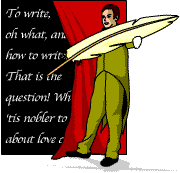Writing Right with Dmitri: Cluing the Reader In
Created | Updated Nov 11, 2012
Words, words, words. That's what we're made of. Herewith some of my thoughts on what we're doing with them.
Writing Right with Dmitri: Cluing the Reader In

Who dunnit? Inquiring minds want to know. When you're writing exciting, well-paced action, whether it's a detective story or a journey of personal discovery for your characters, you want your reader to play along, and try to second-guess the action. How do you do it? Here's a short list of things to watch out for.
- Use strong hooks.
- Make sure the key information is there.
- Use what the reader knows.
1. Use strong hooks.
Readers are not unlike students: they aren't going to retain information unless you first answer the question, 'Is this on the test?' In other words, they have to be motivated to want to know what you want to tell them. Do not start by burying the lead. Keep the key information out of the landscape paragraph. Nobody reads that one. If your plot hinges on the main character's knowledge of the book-binding industry, introduce that field in an interesting way. Have him joshing with his colleagues. Use illustrations, if necessary. Give the reader a fighting chance to remember the relevant factoids.
Of course, you must put the same emphasis on setting up your 'distractors', or red herrings, as well – otherwise the whole exercise is no fun at all. Take Sherlock Holmes. (Please.) In 'The Adventure of the Six Napoleons', somebody's been busting up busts. Of the late French Emperor. Now, obviously, we're going to need to know something about Napoleon, maybe, and about bust-making, certainly. But there's a beautiful distractor here, as well:
"There are no limits to the possibilities of monomania," I answered. "There is the condition which the modern French psychologists have called the 'IDEE FIXE,' which may be trifling in character, and accompanied by complete sanity in every other way. A man who had read deeply about Napoleon, or who had possibly received some hereditary family injury through the great war, might conceivably form such an IDEE FIXE and under its influence be capable of any fantastic outrage." – Arthur Conan Doyle, 'Adventure of the Six Napoleons'
Watson wants a psychological explanation. Holmes makes it clear that we need to look elsewhere, so off they go to a workshop to find out how you make busts of Napoleon. The audience is ready to go with us, and focused on the real issues. That makes it fun for everyone.
2. Make sure the key information is there. In other words, do not cheat.
It is no fair to say, 'Oh, didn't I tell you? The perpetrator was after the victim because, years ago in school, he felt slighted when he didn't win the maths medal.' That sort of fiddling about is dirty pool. Don't do it.
Arthur Conan Doyle is usually a good egg about this, but occasionally, one wonders. WARNING: This passage contains spoilers, so if you haven't ever read 'The Hound of the Baskervilles', and insist on being surprised, stop now.
"My inquiries show beyond all question that the family portrait did not lie, and that this fellow was indeed a Baskerville. He was a son of that Rodger Baskerville, the younger brother of Sir Charles, who fled with a sinister reputation to South America, where he was said to have died unmarried. He did, as a matter of fact, marry, and had one child, this fellow, whose real name is the same as his father's. He married Beryl Garcia, one of the beauties of Costa Rica, and, having purloined a considerable sum of public money, he changed his name to Vandeleur and fled to England, where he established a school in the east of Yorkshire. – Arthur Conan Doyle, 'The Hound of the Baskervilles"
Now, I say that being forced to read this much exposition in a chapter entitled 'Retrospection' rather spoils the fun. Make up your own minds.
3. Use what the reader knows. If your readers are bound to be LOTR fanatics, I suppose it's fine to make the plot hinge on what Gandalf said to that Hobbit, Whatshisname. For some of the rest of us, this might be a bit of a yawn. See Point 1: if the audience is unlikely to know something, make an excuse to tell them about it in advance. For example: if the plot hinges on the correct way to run a dressage competition, explain ahead of time how that works. Otherwise, be sure to print your story in the next issue of Horseworshippers' Monthly.
A side note: Ignoring this tenet is mostly responsible for what Raymond Chandler and others referred to as 'snobbery with violence'. Cast your mind back to the works of Dorothy Sayers and Leslie Charteris. If you're not British, you know what I mean. Even if you are, and you don't happen to remember the upper-middle-class 1920s, you still may find plots that hinge on the correct way to serve cucumber sandwiches a bit de trop.
So: always tell the reader the rules. Get your hooks in. Play fair, and they'll follow you anywhere.
Even into the speak-easy with the dim lights and the hint of danger. Maybe especially there.
Writing Right with Dmitri Archive
